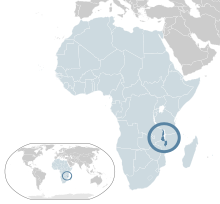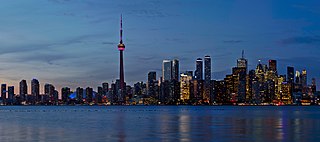
The economy of Canada is a highly developed mixed economy, with the world's tenth-largest economy as of 2023, and a nominal GDP of approximately US$2.117 trillion. Canada is one of the world's largest trading nations, with a highly globalized economy. In 2021, Canadian trade in goods and services reached $2.016 trillion. Canada's exports totalled over $637 billion, while its imported goods were worth over $631 billion, of which approximately $391 billion originated from the United States. In 2018, Canada had a trade deficit in goods of $22 billion and a trade deficit in services of $25 billion. The Toronto Stock Exchange is the tenth-largest stock exchange in the world by market capitalization, listing over 1,500 companies with a combined market capitalization of over US$3 trillion.

The economy of Kazakhstan is the largest in Central Asia in both absolute and per capita terms. In 2021, Kazakhstan attracted more than US$370 billion of foreign investments since becoming an independent republic after the collapse of the former Soviet Union.

The economy of Libya depends primarily on revenues from the petroleum sector, which represents over 95% of export earnings and 60% of GDP. These oil revenues and a small population have given Libya one of the highest nominal per capita GDP in Africa.

Malawi, officially the Republic of Malawi and formerly known as Nyasaland, is a landlocked country in Southeastern Africa. It is bordered by Zambia to the west, Tanzania to the north and northeast, and Mozambique to the east, south and southwest. Malawi spans over 118,484 km2 (45,747 sq mi) and has an estimated population of 19,431,566. Malawi's capital is Lilongwe. Its second-largest is Blantyre, its third-largest is Mzuzu and its fourth-largest is its former capital, Zomba.
The History of Malawi covers the area of present-day Malawi. The region was once part of the Maravi Empire. In colonial times, the territory was ruled by the British, under whose control it was known first as British Central Africa and later Nyasaland. It became part of the Federation of Rhodesia and Nyasaland. The country achieved full independence, as Malawi, in 1964. After independence, Malawi was ruled as a one-party state under Hastings Banda until 1994.

The economy of Malawi is $7.522 billion by gross domestic product as of 2019, and is predominantly agricultural, with about 80% of the population living in rural areas. The landlocked country in south central Africa ranks among the world's least developed countries. In 2017, agriculture accounted for about one-third of GDP and about 80% of export revenue. The economy depends on substantial inflows of economic assistance from the IMF, the World Bank, and individual donor nations. The government faces strong challenges: to spur exports, to improve educational and health facilities, to face up to environmental problems of deforestation and erosion, and to deal with the problem of HIV/AIDS in Africa. Malawi is a least developed country according to United Nations.
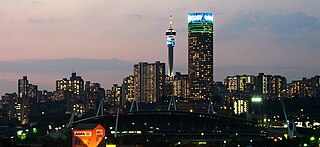
The economy of South Africa is the second largest in Africa and the most industrialized, technologically advanced, and diversified economy in Africa. South Africa is an upper-middle-income economy, one of only eight such countries in Africa. Following 1996, at the end of over twelve years of international sanctions, South Africa's nominal gross domestic product (GDP) almost tripled to a peak of US$416 billion in 2011. In the same period, foreign exchange reserves increased from US$3 billion to nearly US$50 billion, creating a diversified economy with a growing and sizable middle class, within two decades of ending apartheid.

Bingu wa Mutharika was a Malawian politician and economist who was President of Malawi from May 2004 until his death in April 2012. He was also President of the Democratic Progressive Party, which he founded in February 2005; it obtained a majority in Malawi's parliament in the 2009 general election.

Gwandaguluwe "Gwanda" Chakuamba Phiri was a Malawian politician who was the leader of the New Republican Party (NRP). He hailed from Nsanje, a district on the southern part of Malawi. Gwanda Chakuamba attended Zomba Catholic Secondary School, a 2 year metriculation at Sulosi College in Bulawayo Zimbabwe before proceeding to the US to study law though not much is known about whether he did a degree program or a short course.

Joyce Hilda Banda is a Malawian politician, who served as President of Malawi, from 7 April 2012 to 31 May 2014. Banda took office as President following the sudden death of President Bingu wa Mutharika. She is the founder and leader of the People's Party, created in 2011. An educator and grassroots women's rights activist, she was the Minister of Foreign Affairs from 2006 to 2009 and the Vice-President of Malawi from May 2009 to April 2012. She has served in various roles as a member of Parliament and as Minister of Gender and Child Welfare before she became the President of the Republic of Malawi.

Madame Callista Chapola-Chimombo is a Malawian politician and the widow of President Bingu wa Mutharika. She served as the First Lady of the Republic of Malawi from 2010 to 2012. Chimombo is a previous member of the Cabinet of Malawi as a National Coordinator of Maternal, Infant and Child Health and HIV/Nutrition/Malaria and Tuberculosis.

General elections were held in Malawi on 19 May 2009. Incumbent President Bingu wa Mutharika ran for re-election; his main opponent was John Tembo, the president of the Malawi Congress Party (MCP). Five other candidates also ran. The election was won by Mutharika, who was re-elected to the Presidency with around two-thirds of the vote. Mutharika's DPP also won a strong parliamentary majority.

Goodall Edward Gondwe was a Malawian economist who served in his country's cabinet as Minister of Finance on two occasions: from 2004 to 2009, and from 2014 to 2019. He also served as Minister of Local Government from 2009 to 2010 and Minister of Natural Resources, Energy and Environment Affairs from 2011 to 2012.
Tobacco production in Malawi is one of the nation's largest sources of income. As of 2005, Malawi was the twelfth-largest producer of tobacco leaves and the 7th largest global supporter of tobacco leaves. As of 2010, Malawi was the world's leading producer of burley leaf tobacco. With the decline of tobacco farms in the West, interest in Malawi's low-grade, high-nicotine tobacco has increased. Today, Malawian tobacco is found in blends of nearly every cigarette smoked in industrialized nations including the popular and ubiquitous Camel and Marlboro brands. It is the world's most tobacco dependent economy. In 2013 Malawi produced about 133,000 tonnes of tobacco leaf, a reduction from a maximum of 208,000 tonnes in 2009 and although annual production was maintained at similar levels in 2014 and 2015, prices fell steadily from 2013 to 2017, in part because of weakening world demand but also because of declining quality.

The history of human rights in Malawi during recent decades is complicated, and the situation at present is in a state of dramatic, and positive, transition.
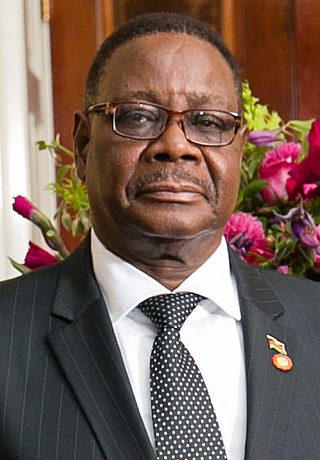
Arthur Peter Mutharika is a Malawian politician and lawyer who was President of Malawi from May 2014 to June 2020. Mutharika has worked in the field of international justice, specialising in international economic law, international law and comparative constitutional law. He informally served as an adviser to his older brother, President Bingu wa Mutharika, on issues of foreign and domestic policy from the onset of his election campaign until the President's death on 5 April 2012.
The 2011 Malawi protests were protests aimed at winning political and economic reforms or concessions from the government of Malawi. On 20 July, Malawian organisations protested against perceived poor economic management and poor governance by President Bingu wa Mutharika and his Democratic Progressive Party. After the first two days of protests, 18 deaths, 98 serious injuries and 275 arrests had been reported. Further demonstrations were organised on 17 August and 21 September The first protest was later cancelled due to the intervention of a UN representative in initiating a dialogue; however, the talks broke down with more protests planned for Red Wednesday through a national vigil.

General elections were held in Malawi on 20 May 2014. They were Malawi's first tripartite elections, the first time the president, National Assembly and local councillors were elected on the same day. The presidential election was won by opposition candidate Peter Mutharika of the Democratic Progressive Party, who defeated incumbent President Joyce Banda.

The Mtwara Development Project is a major infrastructure development project involving southern Tanzania, northern Mozambique, eastern Malawi and Eastern Zambia. The goal of this project is to provide road, rail and waterway access from the surrounding region to the Port of Mtwara. The region and the corridor has been neglected by the respective governments for over 40 years and the recent discovery of oil, gas and various minerals has kick started the development of the project. A road and rail link is to be built from the port of Mtwara to Mbamba Bay on Lake Nyasa to link Malawi to the corridor and further road links into Mozambique will facilitate access to northern Mozambique.
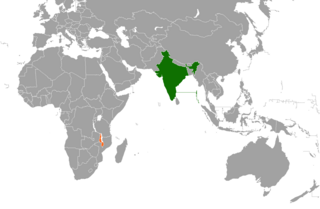
India–Malawi relations refers to the international relations that exist between India and Malawi.
